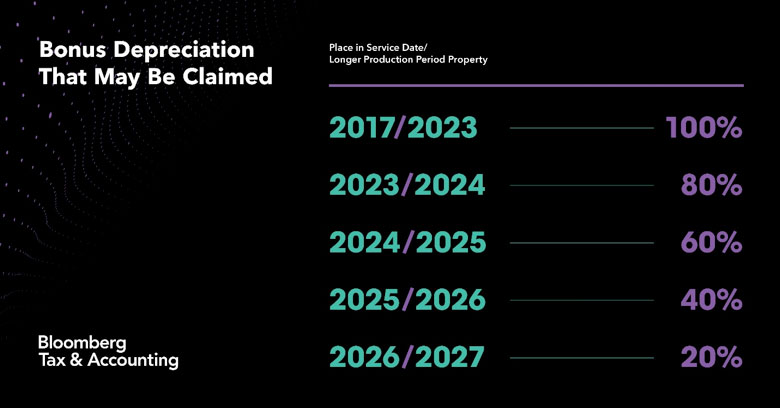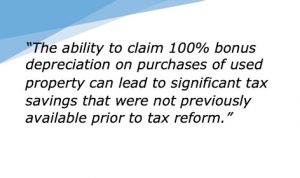Manufacturers looking to get ahead of tax planning can start by understanding the latest rules around bonus depreciation.
January 23, 2020
By Ryan Sheehan, Sr. Product Manager – Software, Bloomberg Tax & Accounting
The passage of the 2017 Tax Cuts & Jobs Act (TCJA) significantly impacted tax depreciation rules, in addition to many other areas of taxation. Arguably the most impactful change for manufacturers is that the bonus depreciation rate for “qualified property” – property eligible for bonus depreciation – is now 100%. However, this rate only applies to qualified property acquired and placed in service through December 31, 2022 and begins to phase out in subsequent years. With the start of a new year, manufacturers looking to take advantage of tax planning opportunities can get a head start by understanding the latest rules around bonus depreciation.

TCJA expanded the definition of qualified property to include used property whereas under prior law only new property was eligible. This may be a significant benefit to manufacturers that purchase, for example, used equipment for use in their manufacturing operations. It is important to note that both used and new property must meet certain acquisition requirements to qualify for bonus depreciation, including:
For manufacturers that are considering purchasing a business, the determination of whether to treat the acquisition as a stock or asset purchase can have a significant impact on the overall economics of the transaction due to the new bonus eligibility requirements. The ability to claim 100% bonus depreciation on purchases of used property can lead to significant tax savings that were not previously available prior to tax reform.
Despite the obvious potential benefit, it is not always advantageous to fully expense the cost of property acquisitions. For example, business organized as pass-through entities, bonus expense reduces a taxpayer’s qualified business income (QBI) thereby reducing the amount of the taxpayer’s QBI deduction (Section 199A). A manufacturer that is entitled to the QBI deduction should consider that the potential income tax effect of deducting 100% of the asset is only 80% of that amount because of the reduction in the amount of the QBI deduction. Furthermore, it may be advisable to elect out of bonus depreciation in a year when the manufacturer has expiring net operating loss carryovers or expiring credit carryovers that could not be used if taxable income were reduced by the bonus depreciation.
Manufacturers that engage in any improvement of their manufacturing facilities should be aware of a drafting error in the TCJA that has caused certain property that used to be eligible for bonus depreciation to no longer be eligible. TCJA streamlined three separate categories of improvement property and replaced them with a single category called “qualified improvement property” (QIP). QIP is defined as any improvement to an interior portion of a building which is nonresidential real property if such improvement is placed in service after the date such building was first placed in service. In drafting the TCJA, Congress failed to assign QIP a 15-year recovery period. Consequently, because QIP is considered nonresidential real property, it has a default recovery period of 39 years, causing it to be ineligible for bonus depreciation.
 Although QIP is currently ineligible for bonus depreciation, a manufacturer with business taxable income may elect to expense up to $1,020,000 of the cost of Section 179 property (including QIP) placed in service in 2019. However, it’s important to keep in mind that the benefits of the Section 179 deduction begin to phase out once asset purchases exceed $2,500,000.
Although QIP is currently ineligible for bonus depreciation, a manufacturer with business taxable income may elect to expense up to $1,020,000 of the cost of Section 179 property (including QIP) placed in service in 2019. However, it’s important to keep in mind that the benefits of the Section 179 deduction begin to phase out once asset purchases exceed $2,500,000.
The bonus depreciation deduction is allowed only in the year in which the property is placed in service, not the year the property is acquired. This is an important distinction for manufacturers because time spent customizing and installing purchased manufacturing equipment often delays its placement in service. Therefore, the acquisition (purchase) date of manufacturing equipment is frequently different from its placed-in-service date.
This will become especially relevant to manufacturers as the 100% bonus depreciation rate begins to phase down after December 31, 2022. In addition, the self-constructed property and written binding contract rules in the September 2019 final bonus depreciation regulations may be of particular concern to manufacturers because those rules determine the acquisition date of an asset that is self-constructed or acquired pursuant to a written binding contract.
TCJA created significant tax planning opportunities related to depreciation, but it also increased the complexity and scope of the rules. Furthermore, the rules will continue to evolve as a result of regulatory and IRS guidance in this space. Manufacturers should continue to pay special attention to this area to ensure they are maximizing opportunities and minimizing risk.

Ryan Sheehan,
Senior Product Manager – Software,
Bloomberg Tax & Accounting
Ryan Sheehan is a Senior Product Manager for Bloomberg Tax & Accounting. He is responsible for Bloomberg Tax & Accounting’s corporate tax products, including Advantage Fixed Assets and Advantage Leased Assets. Prior to joining the company, Ryan was a CPA at KPMG’s Washington D.C. Metro office in the Business Tax Services practice.
Scott Ellyson, CEO of East West Manufacturing, brings decades of global manufacturing and supply chain leadership to the conversation. In this episode, he shares practical insights on scaling operations, navigating complexity, and building resilient manufacturing networks in an increasingly connected world.